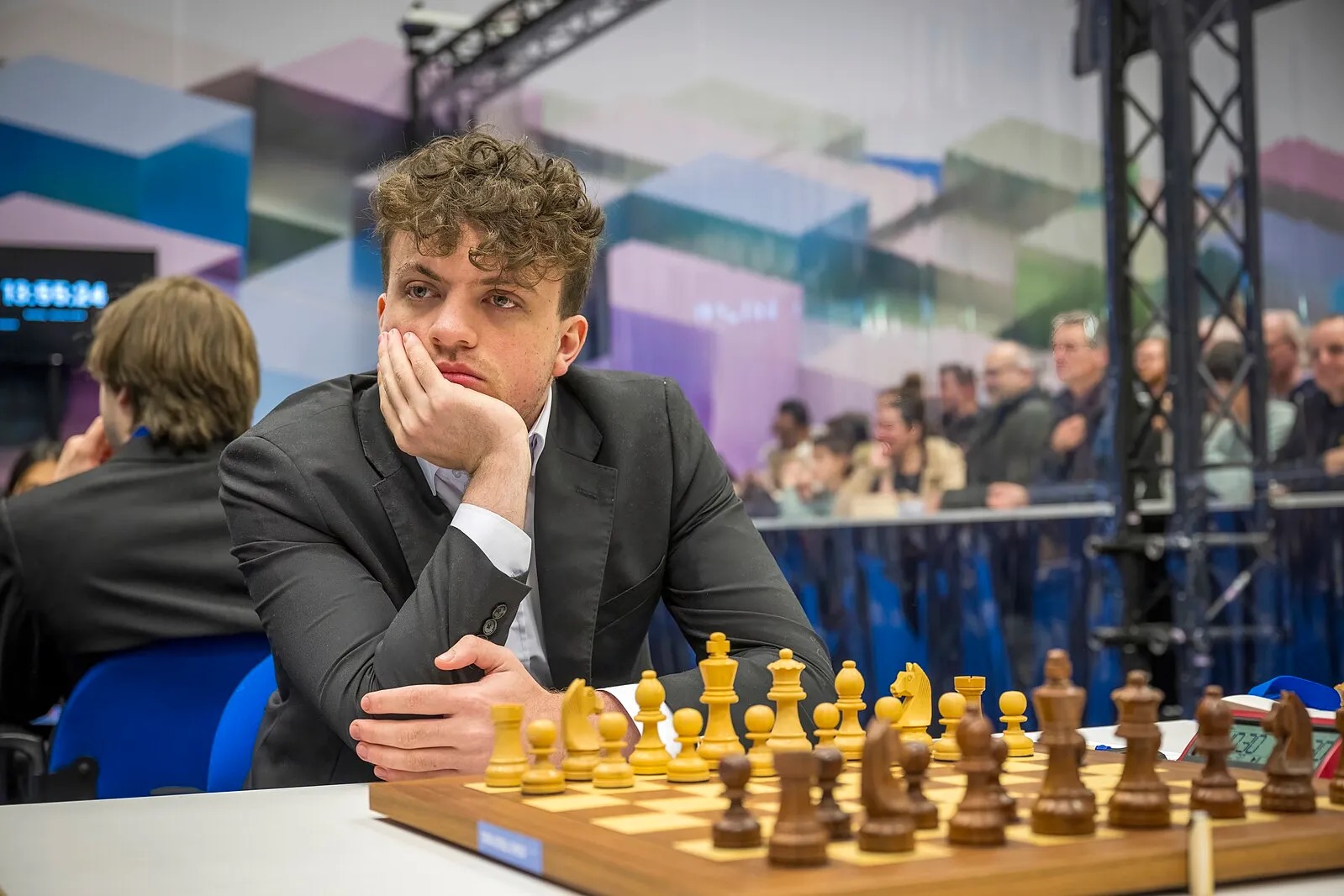
The Slav Defence

There are no windows in the Carlton conference hall, only chandeliers sagging heavy with diamonds and leaking a grim fluorescence. The carpet is an Escheresque swirl of browns and tans, and the chairs and crown moldings are slathered in gold. Outside it’s cold—4 degrees to be exact. Inside, a lone American boils over with shame and frustration. With nothing left to lose, he has come to Moscow.
On February 28th, 2025, Hans Niemann became the first American since 2018 to play in a Russian chess tournament.
That same day, an ocean away, while competitors dropped their bags, picked up their nametags, and headed out to eat, anxiously biding their time before the color draw and pairing announcements, Donald Trump held a now infamous meeting with Volodymyr Zelenskyy.
From one gilded room in Moscow to another in Washington, America’s new relationship with Russia went public.
The metaphor of chess, especially regarding politics, has been so ground down to its figurative essence that we seem to have forgotten that chess is politics.
The game has long served as a microcosm of global events and as a mirror of the political sentiments du jour, perhaps most notably between America and Russia.
Often, a win across the board can become a cultural victory. Each match is imbued with a sense of nationalistic rivalry, and chess’ centuries-long identity as a signifier of intellect has made it a popular means for nations to establish an image of mental superiority. Beneath 64 squares rests lifetimes of tension; it only takes an extra second of consideration to realise the larger implications of any high-profile match.
In 1972, Bobby Fischer became a national hero after becoming the first American to win the title of World Chess Champion against the USSR’s Boris Spassky. But Fischer didn’t become an American icon just because he was a winner. He became an icon because he beat the USSR.
But Fischer was hesitant to play Spassky in the first place and repeatedly threatened to withdraw from the match until Henry Kissinger phoned him personally, coaxing Fischer to perform his patriotic duty.
Chess pros have long been subject to these kinds of immense pressures from governments as their skill is often co-opted in national efforts to establish a clear international soft power. In one profile of an infamous match between Garry Kasparov and Anatoly Karpov, it was noted that ‘the USSR looking for any opportunity to promote Soviet ideals on the world stage, chess players were no different. Their supremacy in the sport was fueled, in part, by the fact that they were looked after exceptionally well by the state.’
But this seemingly vintage Cold-War era global relationship to chess as a conduit of political messaging seems to have been largely forgotten in the 21st century. Nevertheless, it remains as powerful a battleground as ever.
American grandmaster Andrew Soltis noted that the Russian government has a long history of ‘trying to use sports as a political weapon,’ and chess ‘of course, is considered a sport in Russia.’
This is not to suggest, however, that these players themselves are silent—forgive my choice of words here—pawns. In fact, contrary to the more traditional perception of chess as a clean-cut game of pure logic, unclouded by emotion and played by interchangeable buttoned-up robots, most celebrity grandmasters tend to be quite politically outspoken.
In a recent article for The Atlantic titled ‘How America Can Avoid Becoming Russia,’ the aforementioned Russian chess legend Garry Kasparov reminded readers that ‘Exactly 20 years ago, I retired from professional chess to help Russia resist Putin’s budding dictatorship.’ In fact, Kasparov’s unflinching op-eds and highly critical interviews have made him a target of Russian and American conservatives and nationalists alike; when Kasparov criticised Elon Musk in 2022 for suggesting Crimea be given to Russia, Musk responded by calling the grandmaster ‘an idiot.’
Thus, one needs only listen to whatever rants come from FIDE’s finest to get a sense of the underlying political stakes of each match.
After numerous allegations of cheating across the board, the release of a Chess.com report that revealed evidence of upwards of 100 instances of cheating in online matches, and one particularly viral rumour about how this was potentially all conducted via vibrating anal beads, twenty-one-year-old American grandmaster Hans Niemann was effectively blacklisted from the chess world.
By January, it had been a full year since Niemann had played in a tournament. Strapped for cash, rather than give up on his career entirely, Niemann decided to go to Russia to compete in the Aeroflot Open, one of the only tournaments to extend an invitation to him following his ostracisation from FIDE. This, however, only generated further backlash from his critics regarding the ethics of going to Russia three years into their attack and subsequent occupation of Ukraine.
However, while Niemann’s participation in the Aeroflot Open clearly reflects a thaw in Fischer-era American frigidity towards Russia, it certainly doesn’t take a close analysis of a chess tournament to see this painfully obvious new reality. But if the chess world can serve as a weathervane for sociopolitical norms, the fact that Niemann’s successful re-entry into a world that seemed forever out of bounds for him was achieved through such a controversial route—one that even a few months prior would have likely only sunk his reputation—sends a clear message about a global shift in Russia’s soft power.
In a statement posted to the official Chess Federation of Russia website, CFR President Andrey Filatov wrote, ‘The fact that [Niemann] has come speaks for his sound judgement and that he does not mix sport and politics.’ Niemann echoed this sentiment, sharing via X that ‘I’m here to let the chess speak for itself.’
However, this apolitical route of explanation for questionable ties between individual US citizens and Russian organisations is a top-down replication of Kremlin party lines. CFR’s press release parallels a statement published by the Kremlin regarding Trump and Putin’s first phone call on February 12th, which asserted that ‘The President of Russia expressed support for one of the US President’s key arguments, which was that it was time for both countries to work together.’
In times largely characterised by outlandish social inflammation and viral controversy, the quiet development of subtler methods of propaganda can go undetected until it’s far too late. Our acclimation to constant noise quickly makes it impossible to track silent movements, and, even when noticed, they seem somewhat insignificant when inevitably revealed alongside something far more scintillating.
Under the guise of neutrality, normality, and economic rationality, the Trump administration has advanced Russian interests. The explicit political messages of talks about economic and military cooperation with Russia have been deliberately undermined by co-opting the language of ‘peace’ and banality, reframing collaboration between despots as a non-partisan decision in the interest of a nebulous, false image of global unity.
Both Trump and Niemann have become inseparable from their reputations as unqualified, dishonest men. But despite being shunned by their peers out of a widespread moral disdain for their methodologies, both have still managed to hold their ground and rake in a profit—even if the check is written in rubles. And, by making a patronising appeal to rationality and aisle-crossing, high-road-taking apoliticism, Trump and Niemann have in turn invented their own alternate realities to defend against any criticisms of collaboration with Putin’s regime. And whether they believe what they say is ultimately irrelevant; it’s too late to undo America’s increasing cultural comfort with separating Russia from its legacy of violence.
The sudden normalisation of American participation in Russian-sponsored events that the country has long withheld from is no mere coincidence; it is a sign of a new era of cross-continental despotic collusion.
Between global superpowers, nothing, not even chess, is apolitical.∎
Words by Mary Lawrence Ware. Image courtesy Frans Peeters via Wikimedia Commons.







